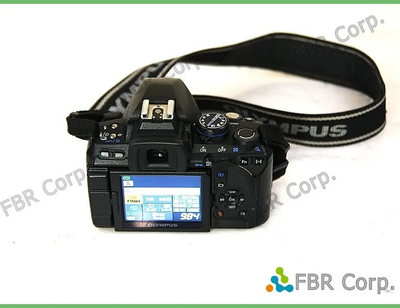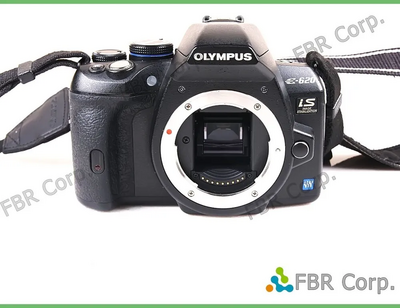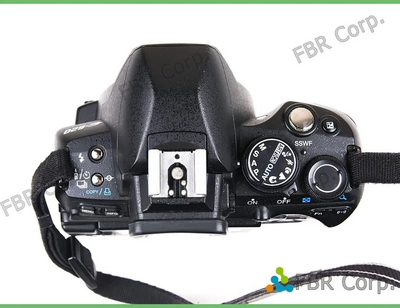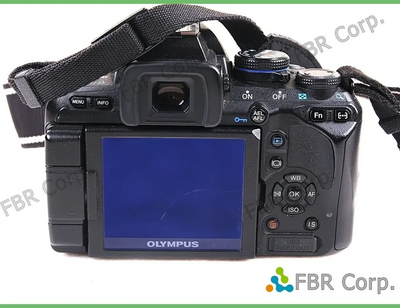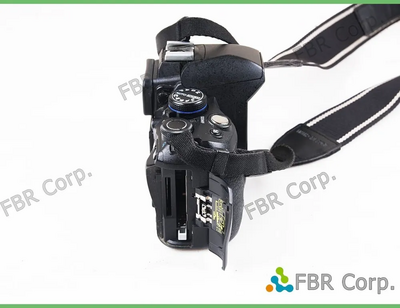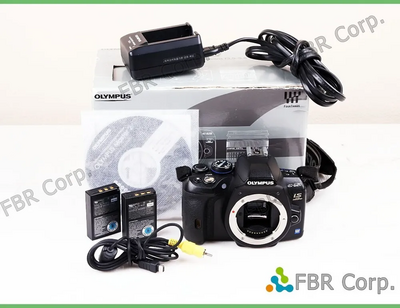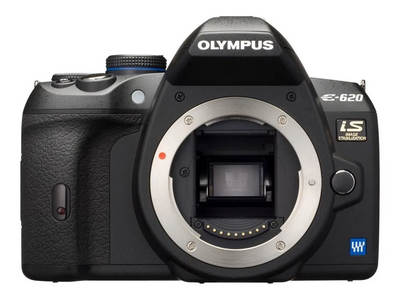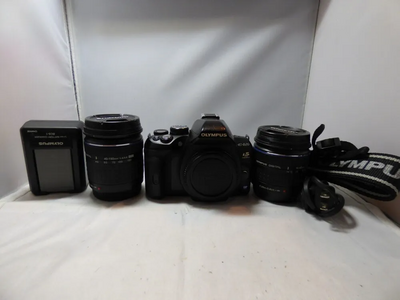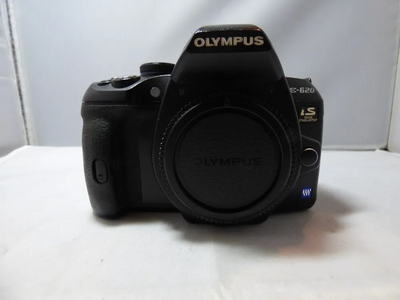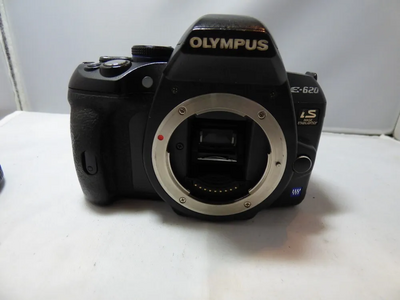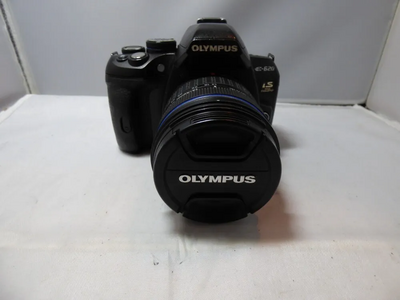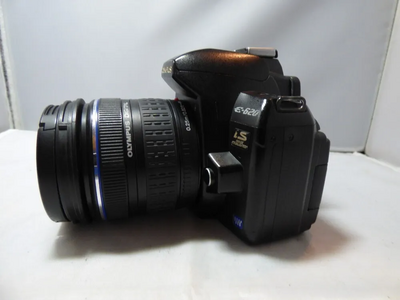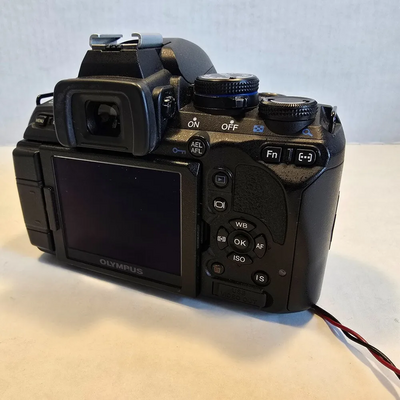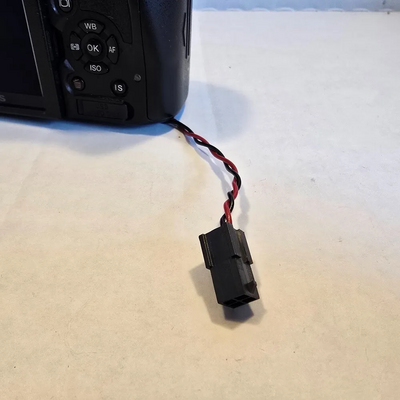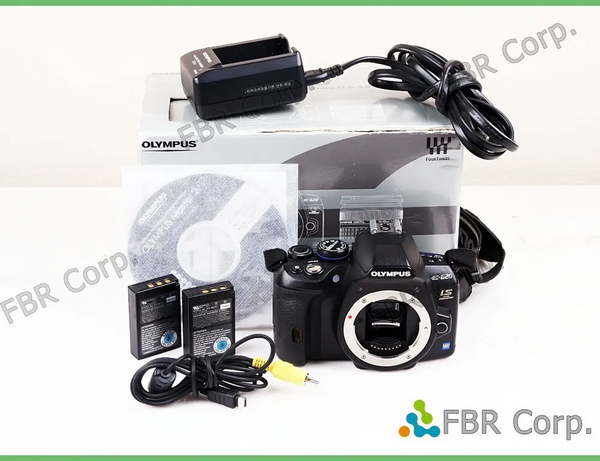
Olympus E-620
| Brand | Olympus 2008 |
| Model | E-620 |
| Released Year | 2008 |
| Type | DSLR Cameras |
| Series | Evolt |
| Color | Black |
| Optical Zoom |
|
| Status | Discontinued |
Quick view
Overview
The Olympus E-620 is a digital single-lens reflex camera introduced in 2008 as part of the Evolt series. It features a 12.3-megapixel Live MOS sensor with a Four Thirds system, providing high image quality and effective noise reduction. The camera supports Live View with both contrast-detection and phase-detection autofocus modes, enhancing focusing speed and accuracy. It utilizes a built-in image stabilization system to reduce shake, allowing clearer handheld shots. The E-620 includes a vari-angle 2.7-inch LCD screen, facilitating flexible shooting angles. Additionally, it offers ISO sensitivity up to 3200 and supports RAW image capture for professional post-processing.
Specifications
| MPN |
|
| UPC |
|
| Model |
|
| Battery Type |
|
| Type |
|
| Color | Black |
| Connectivity |
|
| Features |
|
| Series |
|
| Optical Zoom |
|
| Depth | 2.36in |
| Width |
|
| Item Weight |
|
| Height | 3.7in |
| Screen Details | LCD Display-Tft Active Matrix-2.7"-Color |
| Exposure Compensation | ±5 Ev Range, in 1, 1/2 or 1/3 Ev Steps |
| Light Sensitivity | Iso Auto (200-3200), Iso 100-3200 |
| Sensor Type |
|
| Max Shutter Speed | 1/4000 Sec |
| Lens Type | Zoom Lens |
| Exposure Range | Ev 1-20 (Iso 100) |
| Focal Length Equivalent to 35mm Camera | 28-84mm |
| Face Detection | Yes |
| Special Effects |
|
| Camera Flash Features |
|
| White Balance |
|
| Battery Form Factor | Manufacturer Specific |
| Focus Adjustment | Manual, Automatic |
| Expansion Slot | 1X xD-Picture Card, 1X CompactFlash Card-Type I/II |
| Sensor Size | 13.0x17.3mm |
| Display Size | 2.7in |
| Exposure Modes | Program, Aperture-Priority, Bulb, Shutter-Priority, Manual, Automatic |
| Still Image Format |
|
| Display Rotation | Rotating |
| Screen Size |
|
| Lens System Features | Internal Focusing System, Ed Glass |
| Light Sensitivity Max | 3200 |
| Max Operating Temperature | 40°C |
| Maximum Resolution |
|
| Optical Viewfinder Type | Fixed Eye-Level Pentaprism |
| Red Eye Reduction | Yes |
| Min Shutter Speed | 60 Sec |
| Storage Media Type | None |
| Focal Length Range | 14mm-42mm |
| Display Type | LCD |
| Lens Construction | 8 Group(s) / 10 Element(s) |
| Sensor Resolution | 12.3MP |
| Lens Filter Size | 58mm |
| Exposure Metering | Multi-Segment, Spot, Center-Weighted |
| Additional Features |
|
| Flash Type | Pop-Up Flash |
| Min Operating Temperature | 0°C |
| Viewfinder-Field Coverage | 95% |
| Exterior Color | Black |
| Connector Types | 1X Composite Video Output, 1X USB |
| Shooting Programs | Nature Macro, Underwater Macro, Anti Shake, Multiple Exposure, High Key, Beach/Snow, Sunset, Candle, Underwater Wide, Low Key, Documents, Children, Fireworks, Panorama Assist |
| Flash Modes |
|
| Dioptric Correction Range | -3 to +1 |
| Viewfinder Magnification | 0.96x |
| Camera Type | Digital SLR |
| Auto Focus Type | TTL Contrast and Phase Detection |
| Viewfinder Type |
|
| Lens for Sd |
|
| Supported Flash Memory |
|
| Continuous Shooting Speed |
|
| Country/Region of Manufacture |
|
| GTIN |
|
| Digital Zoom |
|
| Maximum Aperture |
|
| Item Height |
|
| Marke | Olympus |
| Farbe | Schwarz |
| Modell | Olympus E-620 |
| Produktart | DSLR-Kamera |
| Maximale Auflösung | 12,3 Megapixel |
| Custom Bundle | Battery Charger,Battery |
| Item Length | N/A |
| Manufacturer Warranty | N/A |
| Item Width | N/A |
| Megapixels | 12.3 MP |
| Lens Included | Yes (Zoom Lens) |
| Storage Type | SD Card |
| Memory Card Included | Yes (16GB SD Card) |
| Charger Included | Yes |
| Colour | Black |
| Country | Japan |
| Material | Plastic and metal construction |
| Shutter Count | 3,257 |
| Weight | [Insert weight if available] |
| Dimensions | [Insert dimensions if available] |
| Viewfinder | Clear with minimal dust |
| Screen | LCD with protective film, clean and clear |
Images
Key Advantages
The Olympus E-620 excels with its compact and lightweight body, making it highly portable for photographers on the go. Its Live View functionality combined with dual autofocus modes offers versatile focusing options. The built-in image stabilization significantly improves image sharpness in various shooting conditions. The adjustable LCD screen boosts flexibility in framing shots, especially for low or high angles. High ISO performance enables shooting in low-light environments with reduced noise. Moreover, support for RAW format provides extensive editing capabilities for advanced users.
Limitations
Despite its advantages, the E-620's 12.3-megapixel sensor is modest compared to newer models with higher resolution. Its continuous shooting speed is relatively slow, limiting action photography. The autofocus system, although versatile, may be less effective in very low light or rapid motion scenes. The camera lacks HD video recording, which limits multimedia functionality. Battery life may be shorter compared to modern DSLRs or mirrorless cameras. Lastly, the Four Thirds lens system has fewer options compared to more widely adopted formats.
FAQ
What sensor does the Olympus E-620 have?
The Olympus E-620 is equipped with a 12.3-megapixel Live MOS sensor based on the Four Thirds system.
Does the E-620 support image stabilization?
Yes, it features built-in image stabilization to reduce the effects of camera shake.
Can the Olympus E-620 shoot video?
No, the E-620 does not support HD video recording.
What type of autofocus does the E-620 use?
It uses both contrast-detection and phase-detection autofocus modes in Live View for enhanced focusing.
Is the Olympus E-620 still in production?
No, the Olympus E-620 was discontinued after its initial release period.
What is the ISO range of the Olympus E-620?
The camera supports ISO sensitivity up to 3200.
Does it have a vari-angle LCD screen?
Yes, the E-620 includes a 2.7-inch vari-angle LCD screen for flexible shooting angles.
Disclaimer
The content on is provided for general informational purposes only. We do not guarantee the accuracy, completeness, or reliability of any information, specifications, or visuals presented on the site.
is not responsible for any content, images, or data uploaded or shared by users. Users are solely responsible for the content they submit.
We may include links to third-party websites for convenience. We do not endorse or take responsibility for the content or policies of any external sites.
Use of the site is at your own risk. Always verify critical information independently before making decisions based on content from this website.

